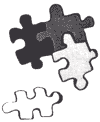
Inferences
Read this brief story carefully. Tom is invited to a family reunion. He over hears his Aunt Geraldine say that everyone in her family has a food allergy.
He observes his aunt’s family selecting food from the variety of dishes people have brought. They all select the same foods — potato salad, garden salad, pasta salad, chicken and ham. None of the family members have the potato salad containing peas, the pasta salad containing peas, or the bean salad containing ... Well, you have probably guessed the type of food they are allergic to. Tom guessed, too. He inferred that his aunt’s family was allergic to peas. He made this inference based on the facts he observed.
What are inferences?
Inferences are guesses or assumptions which are based on facts or details. Readers need to make inferences too. Writers will often leave out facts or details and expect you to infer the missing information. Writers may leave out details because they are minor details, and most readers would infer the details. Writers may also leave out details as a way of forcing you to read carefully and slowly. Mystery novels often require its readers to make inferences.
How do I make inferences?
Before you can make an inference you need information. As you read, pay attention to the facts and details a writer includes. For example, if a character has behaved a specific way in a specific situation before, they are likely to behave a similar way in the future. If a writer says that the road is slippery, water is dripping from a character’s head, and the sky is dark, it is reasonable to infer that it is raining.